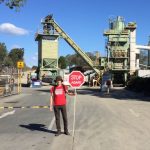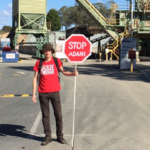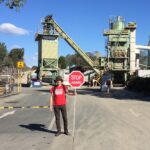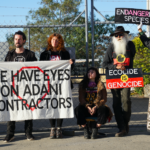Pennings Reigns Victorious Over Adanis’ Five-Year “Attack Dog” Legal Pursuit

Environmental activist Ben Pennings has come out the other end of a five-year-long legal persecution waged against him by Indian business tycoon Gautam Adani victorious.
Pennings signed off on a 26 November 2025 order that ended the yearslong proceedings, as plaintiffs Adani Mining and Carmichael Rail Network dropped the 26 August 2020 filed lawsuit against him, that at one time had been seeking $600 million worth of damages.
The activist considers the movement can learn from this Queensland Supreme Court case, which had involved five different versions of Adani’s claim over time, and damages that dropped to $6 million, as it’s set precedent, as it’s now understood that such lawfare should only be waged when its claimed a defendant primarily sought to harm a plaintiff and was not prioritising an altruistic cause.
Galilee Blockade organiser Pennings drew the ire of Gautam Adani, one of the richest people on the planet, due to his campaigning against his company, which has been known as Bravus in Australia since 2020, and more specifically to disrupt the operation of the Indian mining giant’s Carmichael coalmine, which is located on Wangan and Jagalingou Country in Queensland’s Galilee Basin.
Ben’s victory is not exactly unexpected, however, as Adani had launched a SLAPP suit, or a strategic lawsuit against public participation, against Pennings, which means the mining magnate wasn’t chiefly concerned with receiving damages, but rather the claim served to silence him whilst it was underway in the court for years on end, as well as scaring off other detractors from speaking out.
Pennings’ campaigning that had been so effective that he was targeted for silencing had included online and phone direct actions against companies working with Bravus to operate the coal mine, engaging in public protests and the direct blockading of the Carmicheal site. And while Pennings has agreed to certain stipulations, he’s vowed to continue fighting for the environment.
An abuse of process
“I’m beyond ecstatic this harrowing case is over but very angry the current law allows it. Adani has wilfully abused our court system with 5 versions of their claims against me in 5 years,” Pennings said in a 27 November statement. “They tried to silence me forever, but I can again speak freely about the damage they are doing to Australia’s democracy and precious places.”
“They’ve tried to intimidate concerned citizens, but Galilee Blockade will again actively resist Adani’s reckless plans for Australia. This is a massive victory for everyone who believes in democracy, free speech and the right to protest,” continued the activist, who has long bitten his tongue. “It shows that ordinary people can resist corporate bullying and win.”
Adani came at Pennings with an attack dog strategy devised by a Brisbane law firm that targeted financially vulnerable activists with these SLAPP cases in the courts.
Prior to case announcement, Adani had even sought Anton Piller orders secretly from the courts twice, which, if not denied, would have seen Queensland police raid Ben’s home to prevent destruction of evidence.
These revelations were made even murkier as an affidavit to the court revealed that Adani had hired private detectives to surveil Ben and his family online and out in public.
In November 2018, Adani announced that it was progressing the Carmichael coalmine on a distinctly scaled-down basis, so it would no longer be one of the largest such mines on the planet. And this decision was directly spurred by long-term activists’ campaigning by the likes of Pennings.
Indeed, by late 2016, Westpac became the last of the big four Australian banks to rule out financing the widely critiqued proposal.
“Adani hired big burly men to follow my kids around, twice tried to raid our house and dragged me through harrowing Supreme Court litigation for over five years,” Pennings further laid out. “This was all legal. Labor and the Coalition are clearly more intent on pursuing peaceful climate protectors rather than the violent fossil fuel companies incinerating our future.”
Clarification on weaponising lawsuits
A Supreme Court of Queensland record shows that the plaintiff sought leave to discontinue proceedings and vacate all existing cost orders, with both parties agreeing to bear their own costs. The notice further outlines that Pennings has agreed not to ask anyone working for or contracting to Adani Mining or Carmichael Rail to disclose any confidential business information.
Bravus had alleged in court that he’d obtained confidential information about the company and that his campaigning had amounted to intimidation of contractors to see them pull out of the project. The Indian mining giant claimed in 2020 that this had caused it $600 million in losses. The more precise charges against Ben were both lawful and unlawful civil conspiracy and tortious intimidation.
The Indian billionaire waged this lawfare against the activist, as a clear tactic to silence the effective campaigner, so it could press on with its then much reduced mining proposal. Adani’s claim shifted over time, however, as no longer did it consider Ben had confidential Adani information stored on his computer, but rather, the environmental advocate had only sought to obtain such information.
Pennings succeeded in having several parts of the Adani claim struck out in late 2024, as they’d been “confused and embarrassing”. The court then clarified the limits of a civil conspiracy claim against an activist, in terms of the fact that SLAPP suits often allege that activists have conspired to cause economic harm against a corporation via lawful actions, which has had a chilling effect on activism.
However, this current case has set precedent, as it saw Queensland Supreme Court Justice Susan Brown confirm that SLAPP lawsuits can only succeed if it has been shown that the dominant purpose of the alleged conspirators was to cause harm to the company, and not in the pursuit of an altruistic goal.
So, for example, such a goal would comprise of saving the planet from Carmichael coalmine carbon emissions.
“It may be that, as the defendant contends, when evidence is presented, the court will find that the purpose of the defendant and persons said to be involved in the conspiracy is no more than an intent to stop mines as part of a campaign to reduce anthropogenic climate change,” Justice Brown set out in her 6 December 2024 findings. “In which case, the plaintiffs will not succeed.”
The climate bomb continues
“Serial coal miner Gautam Adani’s writ against peaceful campaigner Ben Pennings will send a shudder through every Australian who values democracy, free speech and the right to peaceful protest,” renowned Australian environmentalist Bob Brown told Sydney Criminal Lawyers in respect of the case filed against Ben in 2020.
“Adani’s writ follows his use of the court to evict Wangan and Jagalingou people from their land in the Galilee Basin where he is proceeding with an obscene environmentally disastrous and unnecessary coalmine,” the former Australian Greens leader added.
After five years in the sin bin, the planet needs Pennings back onside, because the Albanese government has continued to open coal and gas mines just like the Coalition did before it, and it has recently approved the North West Shelf project, which is located on Murujuga land in the Pilbara region of Western Australia, and it comprises the largest climate bomb on the continent.
Albanese, however, is no longer the major offender in this equation, as US president Donald Trump issued a 20 January 2025 executive order halting all action to alleviate the climate crisis in the US, which has supercharged the fossil fuel industry, and is a development that’s directly led the Australian Liberal and Nationals parties to abandon their policy of net zero by 2050.
“I’ve had over five years to think about what I’ll do after winning this court case that has helped protect the freedoms of all Australians,” Pennings said, in looking towards the future ahead of him.
“We are in a climate emergency, and I will never back away from urgent and bold collective action that has long lasting impacts.”







